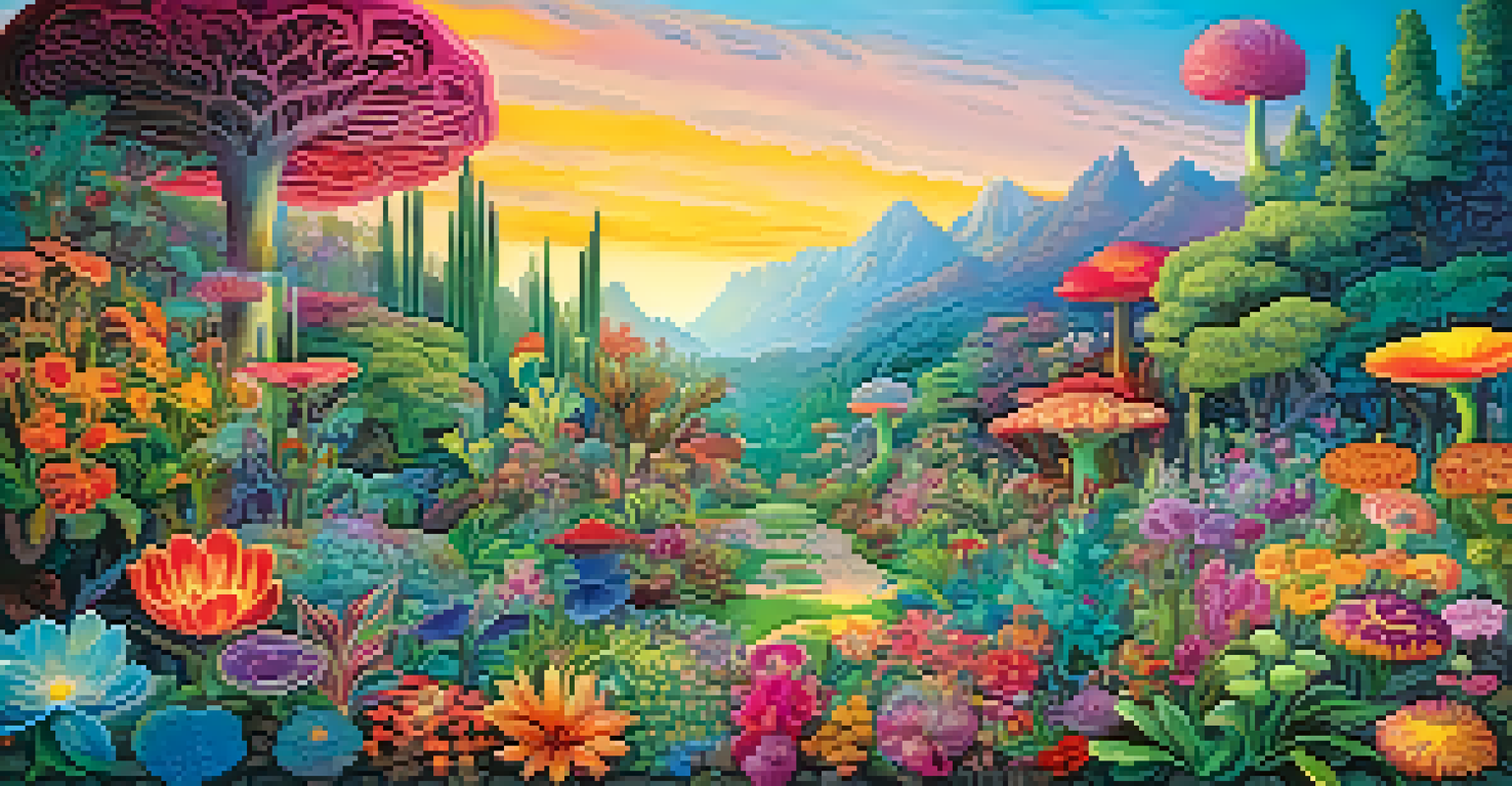Exploring Entheogens in the Works of Aldous Huxley

Understanding Entheogens and Their Significance
Entheogens are substances that inspire a sense of connection to the divine, often used in spiritual contexts. These include plants and fungi like psilocybin mushrooms and ayahuasca, which have been utilized for centuries in various cultures. Huxley was particularly fascinated by the potential of these substances to expand human consciousness and alter perceptions of reality.
There is no such thing as a human being; there are only human beings.
In his writing, Huxley often explored the intersection of nature, spirituality, and human experience. He viewed entheogens not just as drugs but as gateways to deeper understanding and enlightenment. By studying these substances, he sought to uncover insights into the human psyche and the nature of existence itself.
Ultimately, Huxley believed that entheogens could play a crucial role in personal transformation. Through his experiences and writings, he advocated for a broader acceptance of these substances as tools for exploration rather than mere recreational substances.
Aldous Huxley’s Personal Experiences with Entheogens
Huxley's first significant encounter with entheogens came through his experiences with mescaline, a substance derived from the peyote cactus. In his book 'The Doors of Perception,' he detailed his journey under the influence of mescaline, describing vivid visual and auditory experiences that challenged conventional perceptions of reality. This exploration marked a pivotal moment in his understanding of consciousness.

His experiences with mescaline opened the door to deeper inquiries about the mind and its capabilities. Huxley believed that these substances could illuminate aspects of human experience that remain hidden in ordinary states of consciousness. His reflections on these encounters invite readers to consider the profound possibilities that lie beyond our everyday perceptions.
Entheogens as Tools for Insight
Huxley viewed entheogens not merely as substances but as gateways to deeper understanding and personal transformation.
What makes Huxley’s exploration particularly compelling is how he blended personal narrative with philosophical insights. He didn’t just recount his experiences; he used them as a springboard for broader discussions about society, art, and the human condition, weaving a rich tapestry of thought that continues to resonate today.
Huxley’s Philosophical Perspectives on Consciousness
In addition to his personal experiences, Huxley’s philosophical inquiries provided a framework for understanding consciousness. He posited that human perception is limited, much like a filter that restricts our awareness of the broader universe. By engaging with entheogens, he argued that individuals could bypass these filters and experience a more profound reality.
Experience is not what happens to a man; it is what a man does with what happens to him.
Huxley drew on various philosophical traditions, including Eastern spirituality and Western mysticism, to support his ideas. He often emphasized the importance of transcending the ego, suggesting that entheogens could facilitate this journey. By dissolving the boundaries of the self, individuals could connect with a universal consciousness, fostering empathy and interconnectedness.
This perspective challenged the prevailing materialistic view of reality, encouraging readers to consider alternate modes of existence. Huxley’s writings serve as a call to explore the deeper dimensions of consciousness and the potential for transformation that lies within each of us.
The Influence of Entheogens on Huxley’s Literary Works
Entheogens significantly shaped Huxley’s literary output, particularly in his exploration of utopian and dystopian themes. Works like 'Brave New World' reflect a society that has abandoned deeper spiritual connections in favor of superficial pleasures. This stark contrast highlights the consequences of neglecting the inner journey that entheogens can facilitate.
In contrast, his more mystical writings, such as 'Island,' present a vision of a society that embraces spiritual growth and consciousness expansion. Here, Huxley illustrates the potential benefits of integrating entheogens into cultural practices. This duality illustrates his belief that the choice between transcendence and complacency is a fundamental human dilemma.
Cultural Impact on Huxley's Views
Huxley’s exploration of entheogens was influenced by the cultural upheaval and evolving psychological theories of his time.
Through these narratives, Huxley invites readers to reflect on their own relationship with consciousness and society. His literary exploration of entheogens serves as both a critique of modernity and a hopeful vision for a more enlightened future, where inner exploration is valued.
Cultural Context of Entheogens in Huxley’s Time
Huxley’s exploration of entheogens was deeply rooted in the cultural context of the early to mid-20th century. This was a period marked by significant social upheaval, scientific advancement, and a growing interest in alternative spiritual practices. As traditional religions faced challenges, many sought new pathways to understanding existence, making Huxley’s work particularly relevant.
The rise of psychology and the study of consciousness also played a crucial role in shaping Huxley’s perspective. Influential figures like Carl Jung and Sigmund Freud explored the depths of the human mind, paving the way for a broader acceptance of altered states of consciousness. Huxley’s writing can be seen as a response to these developments, merging psychology with spirituality.
In this cultural landscape, Huxley became a bridge between Eastern philosophies and Western thought. His writings encouraged readers to break free from rigid belief systems and explore the vast potentials of consciousness, making him a pivotal figure in the discourse surrounding entheogens.
The Legacy of Huxley’s Exploration of Entheogens
Huxley’s engagement with entheogens has left a lasting impact on both literature and the modern psychedelic movement. His candid discussions about these substances helped demystify their use and opened the door for subsequent generations to explore consciousness in new ways. Today, many view Huxley as a pioneer in the conversation surrounding psychedelics and spirituality.
As interest in psychedelics has surged in recent years, Huxley’s writings have gained renewed attention. His insights into the potential therapeutic benefits of entheogens resonate with current discussions about mental health and well-being. This resurgence underscores the relevance of his work in understanding the complexities of the human experience.
Legacy in Psychedelic Discourse
Huxley's writings continue to shape discussions around psychedelics, emphasizing their potential for therapeutic benefits and inner exploration.
Ultimately, Huxley’s legacy is one of curiosity and openness to exploring the unknown. His writings encourage readers to embark on their own journeys of discovery, challenging them to reflect on the nature of consciousness and the transformative potential of entheogens.
Contemporary Relevance of Huxley’s Ideas
Today, Huxley’s explorations of entheogens remain strikingly relevant as society grapples with mental health issues and a quest for meaning. Many are turning to psychedelics not just for recreation but as a means of addressing psychological challenges. Huxley’s work provides a philosophical foundation for these discussions, emphasizing the importance of inner exploration.
Moreover, the increasing acceptance of psychedelics in therapeutic settings mirrors Huxley’s vision of entheogens as tools for personal transformation. Research into their potential benefits for conditions like PTSD and depression highlights the importance of understanding consciousness. Huxley’s advocacy for responsible use offers valuable guidance for those navigating this complex terrain.

As we continue to explore the depths of human consciousness, Huxley’s insights serve as a reminder of the profound possibilities that lie within. His work challenges us to be open to new experiences and to seek deeper connections with ourselves and the world around us.